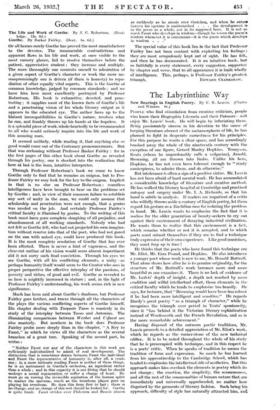Goethe
Goethe. By Barker Fairley. (Dent. is. fah.) OF all heroes surely Goethe has proved the most unsatisfactory to the devotee. The innumerable contradictions and apparent flaws in his life and work, at once visible to the most cursory glance, fail to resolve themselves before the patient, appreciative student : they increase and multiply. The more thoroughly one commits oneself to admiration of a given aspect of Goethe's character or work the more un- compromisingly one is driven (if there is honesty) to repu- diation of other equally vital aspects. This is the Goethe of common knowledge, judged by common standards ; and we have him here most excellently portrayed by Professor Robertson. His book is exhaustive, devoted, and pene- trating ; it supplies most of the known facts of Goethe's life and a penetrating vision of his whole literary output as it appears to the educated eye. The author faces up to the blatant incompatibilities in Goethe's nature, resolves what he can, and frankly throws up his hands at the hopeless. It is a splendid piece of work, whole-heartedly to be recommended to all who would seriously inquire into the life and work of this amazing man.
It seemed unlikely, while reading it, that anything else so good would come out of the Centenary pronouncements. But that was reckoning without Professor Barker Fairley : for in the first pages of this other book about Goethe as revealed through his poetry, one is shocked into the realization that here at last is the born, intuitive interpreter.
Through Professor Robertson's book we come to know Goethe only to find that he remains an enigma, but to Pro- fessor Fairley we may look for the key to the enigma. Implicit in that is no slur on Professor Robertson : countless intelligences have been brought to bear on the problems set by Goethe ; and, in view of their conunon failure to establish any sort of unity in the man, we could only assume that scholarship and penetration were not enough, that a genius was needed on the job. And certainly Professor Fairley's critical faculty is illumined by genius. To the writing of this book must have gone complete sloughing of all prejudice, and abandonment of all working standards. Nobody who bad not felt as Goethe felt, who had not projected his own imagina- tion without reserve into that of the poet, who had not gazed on the sun with naked eye, could have produced this book. It is the most complete resolution of Goethe that has ever been effected. There is never a hint of vagueness, and the clear-dut outline of his vision would seem almost impertinent did it not carry such final conviction. Through his eyes we see Goethe, with all his conflicting elements, a unity—as perhaps humanity itself would seem to the Creator who sees in proper perspective the effective interplay of the passions, of poverty and riches, of good and evil. Goethe as revealed to us here is mightily increased in stature ; and, in the light of Professor Fairley's understanding, his work seems rich in new significance.
Much has been said about Goethe's dualisms, but Professor Fairley goes farther, and traces through all the characters of the plays the various conflicting aspects of Goethe himself. His chapter dealing with Torquato Tasso is masterly in its study of the interplay between Tasso and Antonius. The illuminating comparisons between Werther and litfaust arc also masterly. But nowhere in the book does Professor Fairley probe more deeply than in the chapter, " A Key to Faust," in which he views all the characters as the several branches of a great tree. Speaking of the second part, he
writes : •
"Neither Faust nor any of the characters in this work am sufficiently individualized to admit of real development. The distinction that is sometimes drawn between Faust the individual and Faust the representative of humanity is, after all, a crude one ; in a more intimate reading Faust is neither of these things; he is an instrument, in Goethe's orchestra, an ingredient rather than a whole ; and in this capacity it is not fitting that he should undergo a moral regeneration or stiffer a change of heart. Ile must go on voicing the invincible aspiration of the human spirit to master the universe, much as the trombone player goes on playing his trombone. Re does this from fast to last ; there is no change, and no change of this sort should be looked for. Goethe is quite frank. Faust strides over Philemon and Bawls almost as ruthlessly as he Strode over Gretchen, and when he enters heaven his egotism is undiminished . . . the development is in the poem as a whole, not in its supposed hero. It is not so much Faust who develops in wisdom—though he voices the poem's wisdom whenever it is convenient—it is the poem which develops
in wisdom . ."
The special value of this book lies in the fact that Professor Fairley has not been content with exploiting his feelings : they are most scrupulously kept out of sight. Ile has felt, and then he has documented. It is an intuitive book, but so faithfully is every statement, every suggestion, supported by chapter and verse, that to all appearance it is built wholly of intelligence. This, perhaps, is Professor Fairley's greatest


































 Previous page
Previous page